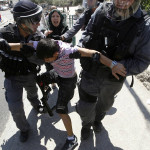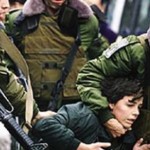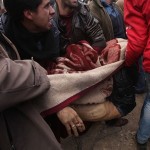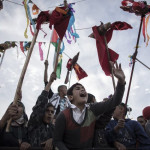‘I support Palestine for the same reason I support the struggle for justice anywhere and everywhere in the world… The same kind of dirty works being done in Palestine are being done in my community.’ — M1, Dead Prez
The so-called Arab-Israeli conflict shoots in and out of the mainstream news but the violent reality of life in occupied Palestine has witnessed no ceasefire. In 1977 the radical writer John Pilger produced the film ‘Palestine is still the issue’, highlighting the mass ethnic cleansing of almost a million Palestinians from their land in 1948 and again in 1967. In 2002 Pilger was forced to make another documentary of the same name, as Israel was engaged in an indescribably brutal campaign of military terror in the West Bank and Gaza in a vain attempt to stamp out the Palestinian resistance. Yet for some, the image of the black and white headscarf, the kuffieh, as a fashion accessory on European highstreets marks the cause Palestine as a middle class issue, as something trendy or a cause for ‘online activists.’ In Britain, the huge potential carried by the movement against the war on Iraq – and by extension the Palestine solidarity movement – was demobilised by groups more concerned with protecting the Labour Party than building real opposition. Meanwhile Palestine is still the issue. And class conscious or anti-racist people in Britain have a responsibility to act.
[youtube]http://youtu.be/vrhJL0DRSRQ[/youtube]
On 12 June 2014, three Israeli settlers were kidnapped as they hiked on occupied land in the West Bank. The Israeli government opportunistically launched a ‘bring back our boys’ campaign and pointed the finger of blame at the Islamic Resistance Movement, Hamas. When they were found dead Israel promised ‘hell’ for Palestinians, arresting over 500 so far in the West Bank and launching air strikes on the Gaza strip. Within days the army had killed four Palestinians aged 14–18. Mohamed Abu Khdeir aged 17 was kidnapped by Israeli settlers near Shufat refugee camp. His tortured and burned body was found less than 24 hours later, dumped by the side of a street. Protests erupted with young Palestinians resisting Israeli forces with petrol bombs and demonstrations. A new intifada (uprising) may well be in the making.
As the BBC speaks of ‘a new cycle of violence,’ the reality is that Palestinians have already witnessed a brutal intensific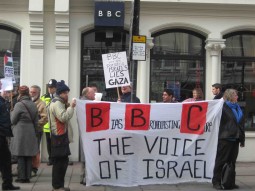 ation of occupation violence in the months prior to this onslaught. One day in March six Palestinians were killed in the space of 24 hours. Forced military house raids and arrests are a daily occurrence. By the end of April 6,354 Palestinians were being held in Israeli jails, including 192 in ‘administrative detention’, a legal mechanism to keep prisoners locked up for months on end without charge or trial. The figure also included 196 children, increasingly the biggest victims of the occupation. In the first two months of 2014 the Israeli army had increased its detentions of Palestinian children by 80%, with 740 arrests; 465 remained in custody for a week or more. The Palestine Ministry of Information recently reported that 1,518 Palestinian children have been killed by Israeli forces since the start of the second intifada in 2000 – equivalent to one child killed every three days.
ation of occupation violence in the months prior to this onslaught. One day in March six Palestinians were killed in the space of 24 hours. Forced military house raids and arrests are a daily occurrence. By the end of April 6,354 Palestinians were being held in Israeli jails, including 192 in ‘administrative detention’, a legal mechanism to keep prisoners locked up for months on end without charge or trial. The figure also included 196 children, increasingly the biggest victims of the occupation. In the first two months of 2014 the Israeli army had increased its detentions of Palestinian children by 80%, with 740 arrests; 465 remained in custody for a week or more. The Palestine Ministry of Information recently reported that 1,518 Palestinian children have been killed by Israeli forces since the start of the second intifada in 2000 – equivalent to one child killed every three days.
Months of 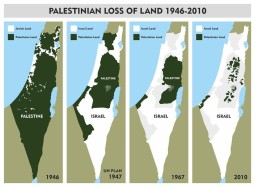 failed ‘peace negotiations’ between Israel, the US and the
failed ‘peace negotiations’ between Israel, the US and the
Palestinian Authority (PA) have led to nothing, and ended in a stalemate as Israel refused to concede anything. The talks were opposed by the majority of Palestinians, representing no challenge to Israeli’s continued land grabs, settlement building and denial of release for political prisoners. The US/UK-backed PA could now face political turmoil as Palestinian youth step up their resistance to Israeli occupation bloodshed. Protests have also taken place in historic Palestine, the belly of the apartheid beast, sowing the seeds of a challenge to the second class citizenship that Israel forces onto the ’48 Palestinians and offering support to the renewed resistance movement in Jerusalem and the West Bank.
‘Palestine remains in my heart forever,
We stand for peace, in times of war we shan’t surrender
Remember, it didn’t start in that dark December,
Every coin is a bullet, if you’re Mark’s and Spencer’ - Lowkey
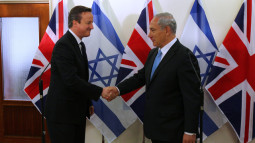 British Prime Minister David Cameron visited Tel Aviv in March to pledge Britain’s ‘unbreakable’ links with the Israeli state. He was followed a month later by Labour ‘opposition’ leader Ed Miliband, who spoke of his ‘deep sense of gratitude to Israel.’ The feeling is mutual. It was a British Conservative politician Lord Balfour who gave his name to the 1917 declaration which signified Britain’s intention to hand Palestine over to the Zionist movement. The result was the forced removal of 750,000 Palestinians to create the state of Israel in 1948, recognised by a British Labour government. Britain’s motives were to create ‘for England a “little loyal Jewish Ulster” in a sea of potentially hostile Arabism’, according to Sir Ronald Storrs, the first British governor of Jerusalem.
British Prime Minister David Cameron visited Tel Aviv in March to pledge Britain’s ‘unbreakable’ links with the Israeli state. He was followed a month later by Labour ‘opposition’ leader Ed Miliband, who spoke of his ‘deep sense of gratitude to Israel.’ The feeling is mutual. It was a British Conservative politician Lord Balfour who gave his name to the 1917 declaration which signified Britain’s intention to hand Palestine over to the Zionist movement. The result was the forced removal of 750,000 Palestinians to create the state of Israel in 1948, recognised by a British Labour government. Britain’s motives were to create ‘for England a “little loyal Jewish Ulster” in a sea of potentially hostile Arabism’, according to Sir Ronald Storrs, the first British governor of Jerusalem.
This loyalty to British and particularly US imperialism is what has kept Israel in supply of $3 billion in US arms each year and 42 vetoes of UN resolutions critical of Israeli actions. In return Israel gave military assistance to fascist and colonialist forces from Pinochet’s Chile to apartheid South Africa, from the Phalange militia in Lebanon to the Nicaraguan dictator Somoza. More recently Israel has bombed Syrian army positions, supporting the US and British stated aim of destroying the Syrian state. It is a known supplier of arms to seven wartorn African countries.
A key message of David Cameron’s Israel visit was his statement that ‘Britain opposes boycotts.’ Why did he feel moved to add to Zionist Prime Minister Netanyahu’s warnings about the ‘delegitimisation’ of Israel by boycott campaigns? Occupied Jerusalem may be 2,244 miles from London but the British capital has been the site of Britain’s longest standing boycott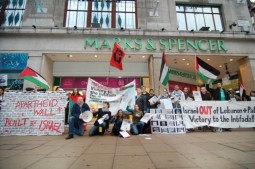 Israel campaign. Outside Oxford Street Marks & Spencer, a key member of the British-Israeli Chamber of Commerce, Victory to the Intifada activists have maintained an ongoing presence, following the lead of a group of young muslims in Manchester who launched the campaign knowing that there needed to be action on the streets and a focus for the boycott movement.
Israel campaign. Outside Oxford Street Marks & Spencer, a key member of the British-Israeli Chamber of Commerce, Victory to the Intifada activists have maintained an ongoing presence, following the lead of a group of young muslims in Manchester who launched the campaign knowing that there needed to be action on the streets and a focus for the boycott movement.
A renewed movement to break British economic and political links with Israel can have a huge impact, just as the anti-apartheid campaigners of the 1980s did in their protests against Barclays and the South African embassy. Although inspired by humanity and compassion, internationalism doesn’t have to mean something apolitical and charity-based. Internationalism is about recognising the common cause working class people have with the oppressed people around the world who are victims of the same system. It is exactly as M1 says it in the quote at the top of this article, taken from a Dead Prez interview with Fight Racism! Fight Imperialism! in Manchester. It is no coincidence that bosses of companies trading with Israel, including M&S and Boots, wrote to British Chancellor George Osborne in 2010 urging him to continue and ‘strengthen’ his cuts programme. These politicians and corporations are the enemy of working class people from the West Bank to the West Midlands.
On 27 February PFLP activist Moataz Washaha was killed brutally as Israeli troops lay siege to his house in Bir Zeit village. His sister Shorouq released a passionate statement to the world:
‘I ask all the world to boycott Israel in its entirety. And I ask the same of all institutions dealing with the Israeli Occupation. Boycott the Occupation… Boycott is an act of resistance.’
Victory to the Palestinian people!
Boycott apartheid Israel!
Read More https://www.facebook.com/victory2palestine
M1 Dead Prez on Palestine
[youtube]http://youtu.be/LEd20A6SKS8[/youtube]
Guest Author
Latest posts by Guest Author (see all)
- ‘TODAY’S HIP HOP IS TOMORROW’S RELIGION’ BY ABSTRACT BENNA — January 23, 2022
- POETRY | ‘DIAMONDS WITH HIS BARE HANDS’ BY JAVON RUSTIN — January 4, 2022
- REMEMBERING JACKSON TURNER, MC HERETIC — October 26, 2020


